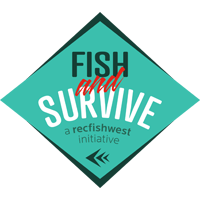Fresh Water Fishing
When out in the wilderness, follow these tips to return home again
Freshwater fishing is often undertaken in picturesque surroundings where potential risks seem minimal. However, hazards still exist. Please see our safety checklist to enjoy freshwater fishing safely.
1. Know the conditions
Make sure you are aware of local weather before going fishing. Once at a fishing location take time to observe the current conditions, they may be different to those predicted or may be changing.
For more on conditions, see bom.gov.au
2. Wear the right clothing
For warm weather:
Because of the harmful effects of the sun and its ability to cause skin cancer, it is a good idea to wear a high SPF sunscreen as well as a hat and protective clothing with long sleeves and light colours to reflect sunlight. Because UV rays from sunlight can harm your eyes, it is a good idea to wear sunglasses. In addition to sun protection, polarized sunglasses can reduce the glare from sunlight reflecting off the water's surface, allowing you to see beneath the surface of the water to spot fish, even on sunny days.
For cold weather:
In cold weather it is very easy to lose body heat. Long, warm clothes that cover as much body surface as possible and beanies or hats can help retain this body heat. In cold weather gloves can also help to keep you warm and you can purchase lightweight rubber gloves or finger-less gloves that allow you to handle tackle and stay warm. If rain is likely it is important to bring waterproof (not just water resistant) gear such as a jacket with a hood and/or waterproof pants.
3. Know how to swim
There are many situations where as a fisher you might be required to swim during the course of your fishing activities; either for recreation or in an emergency. If you fish, you should know how to swim for your own safety. If you are a poor swimmer it is best to wear a Personal Flotation Devices (PFD) and have an experienced swimmer with you at all times.
For more on learn how to swim, see royallifesaving.com.au
4. Tell someone your plans
It is always a good idea to let a responsible person know where you will be fishing and what time you plan on returning.

